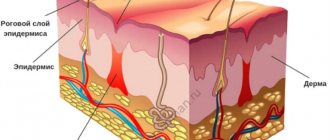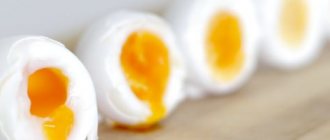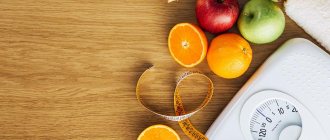A woman’s nutrition during pregnancy is important not only for her own health. Over the course of nine months, the child’s skeleton, muscle tissue, internal organs and nervous system are formed.
A pregnant woman's nutrition is important not only for her own health. Over the course of nine months, the child’s skeleton, muscle tissue, internal organs and nervous system are formed. Any food eaten can be beneficial or harmful to the baby growing in the tummy. That is why it is important for every mother to know everything about proper nutrition, what food to choose, and what dish to refuse, even if you really want to.
Learning to eat healthy during pregnancy
Women can make many common mistakes during pregnancy. Every mother should know the basic rules and features of nutrition during this “special” stage of life1,2.
Eat regularly
Pregnant women have a very capricious appetite. “Today I don’t feel well in the morning, I have no appetite - I won’t eat anything. In the evening I get hungry - I “attack” the refrigerator and sweep away everything.”
This approach is fundamentally wrong. If a pregnant woman eats irregularly, from time to time, she will constantly have digestive problems: constipation, heartburn, bloating. To avoid this, you should stick to the regime. Even if there is no appetite at all, you need to eat at least a little at the right time.
Follow the regime
“In the middle of the night I woke up with a ravenous appetite. I go to the refrigerator and eat everything: yesterday’s pilaf, buns, a piece of cake and herring with orange juice.” This behavior is familiar to many pregnant women.
Usually women indulge their weaknesses during the period of bearing a child, and this is completely in vain. Abundant night snacks lead to disturbances in the digestive tract and the gain of extra pounds.
If you feel like having a snack late in the evening or even at night, it is better to drink a glass of low-fat kefir or yogurt. This will help relieve the feeling of hunger, you will be able to fall asleep easily, and there will be no heaviness in your stomach.
Drink more water
A pregnant woman's body reacts very sensitively to any deviations in nutrition. If a woman eats dry food, her risk of constipation, gastritis and other gastrointestinal diseases increases significantly. To keep your digestive system working like a charm, it is important to regularly eat liquid foods and drink enough fluids (water is best). Light soups made from lean meats and fish are always a priority.
The rate of water consumption depends on the characteristics of the woman’s body and the duration of pregnancy, but on average it is recommended to consume at least 2300 ml of liquid per day.
Sugary carbonated drinks should be completely avoided. It is better to prepare homemade fruit drinks, compotes and herbal teas. You should also avoid strong tea and coffee.
Breakfast is an important start to the day
The first meal of the day “launches” the entire digestive system and awakens the entire body. Neglecting breakfast leads to overeating during the day or evening and has an adverse effect on the pregnant woman’s body. If you feel nauseous in the morning and don’t feel like eating at all, then you can drink a little yogurt or fruit drink.
Avoid spicy and salty foods
The first months of pregnancy are usually accompanied by a strong craving for “spicy” and “salty” foods. It is advisable, but not necessary, to completely avoid spicy and overly salty foods during pregnancy - it is important to know when to stop. Salty and peppery foods can lead to heartburn and fluid retention in the body of a pregnant woman.
Keep it in moderation
I eat for two. This is a favorite nutritional principle for many pregnant women. Eating for themselves and the baby, they often exceed all acceptable standards so much that in a short time they gain an extra 10-15 kg.
This is a fundamentally wrong approach. In the first trimester, the baby growing in a woman’s belly is still very tiny. He doesn't need an adult portion of food. Mom needs to eat nutritiously and variedly, but in moderation, focusing on the quality of nutrition, not quantity.
The onset of pregnancy is an important reason for a pregnant woman to reconsider her eating habits and switch to a balanced diet.
salt-free diet for pregnant women
Here I will tell you a little about my first birth, to make it clearer why I was afraid of the third birth and what I encountered.
My first birth took place at 40-41 weeks. My first-born Dmitry was born weighing 4070 and 54 cm. Thanks to him, I learned what false contractions are and what’s wrong with them. I had practically no toxicosis, only terribly sick in transport. It was like this throughout my pregnancy.
The due date was in August. PDR August 5th. The summer of 2013 was very hot in St. Petersburg. I was a very inexperienced pregnant woman and strictly followed the doctor’s recommendations. And she recommended that, as a preventive measure for edema, I should reduce my fluid intake to 5 glasses a day, including everything (fruits, soups, milk, etc.). My advice to you is if you don’t have any special indications, i.e. confirmed problems with the genitourinary system, i.e. with kidneys, do not do this under any circumstances! No salt-free diets or drinking restrictions! Drink plain clean water in any quantity. Add salt a little at a time, you can’t eliminate it completely. there must be moderation in everything.
But I didn’t know it then, the swelling was growing, and so was the weight. The salt-free diet did not help, and as a result, on August 1, I ended up in the prenatal department. Before this, I had already been to a day hospital for the same reason. There I was given drips with magnesium and aminophylline for 2 weeks. Of course, they didn't help me. In the maternity hospital they continued this treatment, although I immediately said that magnesia does not help me, moreover, it gives me an allergic rash. But who started listening to me?
I move on to the part about false contractions. Around August 8th I started to feel sick. The mucus plug has come off. I'm an advanced Google user, so I waited for labor to start. Only they didn't start. The 8th passed and nothing. The 9th came and again nothing. What is the downside of these contractions - they can last for a long time, even for days, but they do not give relief. This is the first disadvantage, from which the second smoothly follows - it doesn’t exhaust you. Both physically and psychologically. You think that this is “it”, but this is not “it”, and these contractions can really be painful. So imagine the tortured state in which I ended up in the maternity ward. By the way, nosh-pa does not help. This is where the placebo effect comes into play. This is not my opinion, but that of the doctors at the maternity hospital. The same applies to papaverine suppositories and ginipral droppers. I repeat once again that we are talking about false contractions. Maybe in other cases this all helps. What to do? Warm shower and still try to rest, because you will really need strength later.
I didn’t have the strength, moreover, no one will keep you in the maternity hospital with false contractions. No disclosure - free. They had already handed me a discharge form; in response to my feeble attempts to explain about the traffic jam and contractions, they brushed me off with the words that I “can go on like this for another week.” But lo and behold, before discharge they decided to examine me again, it turned out that I was dilated, moreover, my false contractions smoothly turned into real ones. Only the real ones were very weak.
They punctured my bladder and gave me medical sleep. An hour later everything is the same. All this time I was lying under CTG. When you can move, the pain is easier to bear. The dilation was slow, according to the doctors, so they decided to inject me with oxytocin. Contractions caused by oxytocin are much more painful. I admit, I screamed in pain. The first birth, after all, I was clearly not ready for such sensations. After 8 hours, dilation became complete. It’s just that by the time of pushing there was no strength left at all. I pushed for a long time, at first incorrectly, and then I had to push the baby out completely. Among other things, the brain actually perceives information worse from all medications; it takes a long time to understand what is being asked of you. I was cut during a contraction. It doesn't hurt, the cramping pain covers it. Thank God everything ended well. My son was born on August 10th. Apgar was 7/8.
Then they cleaned me and stitched me up. They numbed me with ice-caine, so I felt everything very well. It was impossible to sit for a month. The consequences of this birth came back to haunt me in the second place.
Principles of proper nutrition during pregnancy
There are several basic changes in diet that a pregnant woman should consider applying for her own and her baby’s health2:
- Switch from three to five meals a day.
- Reduce portion sizes.
- Don't overeat, but don't skip meals either.
- Maximize your variety of dishes.
- Exclude from the menu fast food, store-bought convenience foods, juices (the latter contain too much sugar) and any products containing flavor enhancers and preservatives.
- Eat more greens, fresh berries, vegetables and fruits.
- Enrich the menu with meat and fish dishes, as well as dairy products.
Try to consume all food groups in proportionate amounts: vegetables and fruits should make up half of your virtual plate, whole grains (such as cereals, cereals or whole grain bread) and protein-rich foods (such as meat and fish) the other half . If you are intolerant, it is important to consume dairy products regularly; they are rich in protein and calcium. Fats (especially animal fats), sugar and salt should be consumed in moderation3.
Reasons for appointment
A salt-free diet during pregnancy is a remedy for many diseases. Already from the name it becomes clear that the meaning of this diet is to completely avoid salt in food.
It is worth dwelling on each of the difficulties in more detail. Salt retains fluid in the human body, resulting in swelling in the arms, legs, and face. The expectant mother’s tests immediately deteriorate significantly; protein is found in the blood and urine. This is followed by an increase in blood pressure and a deterioration in the well-being of the pregnant woman, and therefore the baby inside her. In the later stages, this state of health of a pregnant woman develops into gestosis.
Indications for the diet:
- with swelling;
- with too much weight gain;
- diseases of the gastrointestinal tract, kidneys, liver, joints, heart or blood.
If a woman has gained too much during pregnancy, she will definitely be asked to lose weight in the final stages. The safest method is a salt-free diet during pregnancy.
A diet without salt for pregnant women will help overcome swelling and remove excess fluid from the body without the slightest harm.
The use of dietary nutrition during pregnancy is prescribed only by a doctor; making a decision on your own is unsafe. After all, not everyone is allowed to diet.
https://youtu.be/3FQQrnC1KCE
Recommended daily food intake
According to the recommendations of the Federal State Budgetary Institution “Federal Research Center for Nutrition and Biotechnology”, pregnant women should consume the following amount of food per day4:
- Wheat bread 120 g;
- Rye bread 100 g;
- Wheat flour 15 g;
- Cereals, pasta 60 g;
- Potatoes 200 g;
- Vegetables 500 g;
- Fresh fruits 300 g;
- Juices 150 ml;
- Dry fruits 20 g;
- Sugar 60 g;
- Confectionery 20 g;
- Meat, poultry 170 g;
- Fish 70 g;
- Milk, kefir and fermented milk products no more than 2.5% fat content 500 ml;
- Cottage cheese 9% fat 50 g;
- Sour cream 10% fat g;
- Butter 25 g;
- Vegetable oil 15 g;
- Egg 0.5 pcs.;
- Cheese 15 g;
- Salt 5 g.
Prohibited Products
The following should be excluded from a pregnant woman’s diet:
- raw fish/sushi/rolls;
- raw or insufficiently heat-treated products of animal origin - meat, minced meat, milk, soft cheeses (except those made from pasteurized milk);
- blue cheese;
- homemade canned goods;
- poorly washed fruits and vegetables.
When eating raw fish, the mother's body can become infected with parasites. Their waste products are toxic to the embryo. Remember that even vegetarian sushi and rolls or those containing cooked fish can be dangerous, as they are usually prepared by the same chefs and using the same equipment as those containing raw fish.
Raw animal products may contain pathogenic bacteria. Rare steak or carpaccio should be avoided. When choosing a soft cheese (such as feta), you need to make sure that it is made from pasteurized milk (indicated on the label).
Blue cheeses may contain the bacterium listeria. This bacterium can cause irreparable harm to the baby's health.
Poorly washed fruits can be infected with toxoplasmosis, which is also very dangerous for the life emerging in the womb.
Consumption of home-canned food is fraught with the development of botulism (damage to the nervous system).
Nutritional features of a pregnant woman by trimester
In the first trimester, a woman does not have to significantly adjust her diet. However, you should take folic acid (also called vitamin B9) alone or as part of a multivitamin, and eat more whole grains, vegetables and dairy products. If you suffer from morning sickness, you can drink still water on an empty stomach or eat biscuits.
In the second trimester, the uterus begins to actively grow. The daily amount of calories consumed must be increased to 2500. The menu should contain enough fiber, which will help avoid constipation and other digestive problems. A woman also needs to consume enough protein, iron, calcium, and vitamin D.
In the third trimester, the mother's body begins to gradually prepare for the upcoming birth. It is necessary to continue to support the body with quality nutrition. Throughout the day and throughout the week, you need to combine foods of plant and animal origin. You need to eat 5-6 times a day3.
Every expectant mother needs to remember that proper nutrition and a well-structured lifestyle are extremely important during pregnancy. Taking into account all the above nuances, you can avoid many problems and calmly focus on the upcoming birth.
Permitted terms of use
A salt-free diet during pregnancy is useful and sometimes necessary, but it is not always possible to use it. In the early stages, doctors do not recommend dieting, unless it is required by the treatment of a serious disease of the heart, kidneys, blood or gastrointestinal tract.
In the first trimester, the female hormonal background directs work to ensure that the embryo is properly established and begins to actively develop. The body contributes to this process in every possible way. Therefore, the salt balance balances itself: with a low salt content, a woman is drawn to salty foods, after which everything returns to normal, the indicators level out, high blood pressure, dizziness, and nausea go away.
In the second trimester, salt restriction is also contraindicated. But you can start reducing the amount of salt consumed from 15g. up to 7g, this must be done gradually, periodically reducing the volume. It is important to understand that for the harmonious development of a baby, many elements are needed, including salt. If it is not enough, the fetus will compensate for the deficiency at the expense of the mother’s body, which will not have the best effect on the woman’s health.
Starting from the third trimester, gynecologists recommend following a diet without salt. This period of swelling and extra pounds will be easier to survive without salt. This type of nutrition will help preserve your health and make the last weeks of pregnancy less unbearable.
https://youtu.be/osdBrHDHZII









